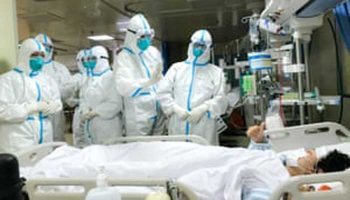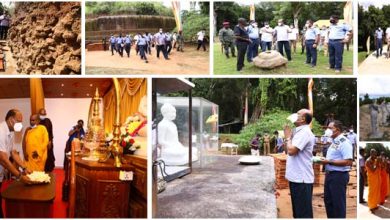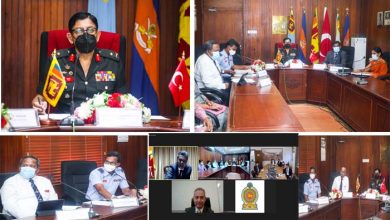
By

Prof. DAC Suranga Silva
Department of Economics University of Colombo
The Coronavirus COVID-19 outbreak has become the most devastated and World-shocked disaster for human and its socio-economic development recent past, affecting millions of people in different ways with different intensities and creating the shocking dead for nearly 40,000 of people in the world.
Unfortunately, still the whole world is at the initial stage of this deadly virus and not yet found any vaccines/drugs in the pipeline against for COVID-19. On the other hand, the disaster is rapidly growing by making the whole world in an array of misery and leading toward severe economic recession and collapse. At this time of writing this article, there have been more than 781,441 Confirmed Cases of Coronavirus COVID-19 Virus and more than 37,578 Deaths from the disease and recovered only 164,726 persons (on 30th March 2020). The Coronavirus COVID-19 is affecting 199 countries and territories around the world. Even as the number of most of new cases in China is not reporting inside of the country, the virus is spreading and increasing exponentially in most of developed countries such as Italy, Spain USA, UK (more than doubling approximately every four days).

Though it is importance to highlighting the degree and density of this outbreak of Coronavirus COVID-19 Virus, at this time, the most important task as a country having with less resources is to comprehend the possible impact of Coronavirus COVID-19 and rightly implement the most effective strategies to prevent the possible disasters coming through this deadly virus.

In this context, it is well-meaningful to discuss how we can successfully manage this disaster and what would be the most suitable strategies to be used on this purpose with the lessons learnable from the best practices of successful countries in managing this Coronavirus COVID-19 disaster.
In considering the key stages of Disaster Management Cycle, it is important to clearly apprehend the ongoing process of Strategic Plans and Activities for reducing the impact of Coronavirus COVID-19 disaster as a valiant nation and its key stakeholders: government, business & cooperate sector, professionals & civil societies and people itself.
Appropriate actions at all points in the cycle must require a greater preparedness. It should also include the shaping and redesigning of current public policies and plans for recovering from future possible disasters while ensuring the continuation of the required growth and development of the country in sustainable way.
At present, the most important task is to examine how far our strategies can effectively address the issues of Response Stage on Coronavirus COVID-19and what else we SHOULD DO as a nation to protect our people.
“Doing the Right Things” and “Doing Things Right”
At the Response Stage on Coronavirus COVID-19, the main target is to provide immediate assistance with most effective ways of facilitation and supports to maintain normal life ensuring the health and safety of the people. Successful solutions to ensure the basic needs of the people is fundamental to make all these endevours a great success. Both Strategic Thinking (Doing the Right Things) and Tactical Thinking (Doing Things Right) aremomentouslydecisive in this context.
It is a known factor that the majority of people of our country have not realized the possible danger of this Coronavirus COVID-19 disaster, similar thinking like when Sri Lanka was facing Tsunami in 2004.
Nevertheless, the government has taken immediate necessary actions against the virus ones it realizes that the situation is getting serious and danger for the nation.
In general, at the response stage of this type of health disaster, precise evaluation of the possible health requirements and the Capacity Threshold of the country’ health sectormust be instrumental. It is useful to exactly identify how far and how fast the virus can be manageable at the current resources and facilities. This task has been successfully carried out by the health authorities with the support of professional association like SLMC.
However, despite the frequent updates by news media, public health agencies and independent researchers tracking the outbreak, the available data may represent only a Tip of the Iceberg, many of which might have gone unreported.

Flattening the Curve: “Flattening the Impact Curve” of deadly Coronavirus COVID-19 can do much faster through proper public awareness and education. This will encourage people to do useful measures to ensure their Social Distancing. This has already proven as one of the most effective strategies to control Coronavirus COVID-19 in South Korea, Japan, Taiwan and Singapore. These countries have successfully controlled the large outbreaks of this virus by flattening the Impact Curve of new infections, without using China’s draconian restrictions and possibly economically damaging lockdowns.
Social Distancing and Self-Isolation will have a considerable impact to flatten the Impact Curve of deadly Coronavirus COVID-19 in our country.
One of the most effective ways in this context is to create right awareness through public and social media with the coordinated supports from the civil & religious organizations and local agencies under the strong vigilance of government authorities.
Sri Lanka, as the FIRST COUNTRY IN SOUTH ASIA, imposed a nationwide weekend curfew on Friday (March 20) by clearly understanding the gravity and seriousness of possible impact of deadly Coronavirus COVID-19. Government started advising the public to stay home and avoid going to malls unless essential, so as to curb local transmission of the virus. The SLMC and other professional associations have provided necessary consultations to the authorities being a part of decision-making process under the President’s Task Force of Coronavirus –COVID 19. There have been so many requests to the public to take safe distancing seriously and the advisory sent via the government media and all kinds of other media channels including WhatsApp, Viber social media.
Anyway, provision of all kinds of immediate necessary assistance and supports is determining how fast or what effectiveness of our nation endevours to be able to flatten the Impact Curve of deadly Coronavirus –COVID 19.
Lessons Learned from the Regional Success
The Global Health Security (GHS) Index in 20th March 2020 (https://www.ghsindex.org/) comprehensively assessed and benchmarked the Health Security and Related Capabilities by each nation of the world.
For this GHS index, Six Key Factors have been taken into consideration for the ranking with an overall score for each of 195 countries of the world: (1) Prevention: Prevention of the emergence or release of pathogens; (2) Detection and Reporting: Early detection and reporting for epidemics of potential international concern; (3) Rapid Response: Capability of rapidly responding to and mitigating the spread of an epidemic; (4) Health System: Sufficient and robust and health system to treat the sick and protect health workers; (5)Compliance with Global Norms: Compliance with international norms by improving national capacity, financing plans to address gaps and (6) Risk Environment: Risk environment and country vulnerability to biological threats.
In consideration of this Global Health Security (GHS) Index, Human Development Index (HDI) and Per Capita Nominal GDP, a comprehensive comparison of the actions taken by four major countries in Asian Region, namely, China, South Korea, Singapore and Taiwan, is carried out herewith with the most affected country in the European region, Italy on the purpose of getting clear understanding of successful lessons against the Coronavirus –COVID 19.
China has proven that the Coronavirus –COVID 19 can be stopped in its tracks and the course of the outbreak can be altered. The development of the outbreak is not given an opportunity to reach its high peak of danger if the health services are provided overwhelmingly at right time to right people valuable to the virus by ensuring its Triage effort.
One more lesson can be learnt from the success stories in the region is that each country can apply different ways of solution-packages to control Coronavirus COVID-19 under their own circumstances. Status of socio economic development and politico-cultural settings in each country can be different.
It is important to analyze not only the total number of people affected and dead but also the ratios of dead and recovered. From these ratios, intensity of human damages and also the successfulness or failures of implementation of health and other related facilities can be measured.
In this context, the most successful countries for having lowest death ratio and highest recovered ratio are Taiwan, Korea and China only.
Table 1: Comparison between Death Ratio and Recovered Ratio

Italy has the highest death ratio and lowest recovered ratio. However, though Singapore has the lowest dead ratio its recovered ratio is still at lower level compared to China and South Korea. In overall, Taiwan has shown the best achievement compared to the other selected countries. Recovered Ratio can be lower not only because of the health facilities utilized by each country, but also due to the initial stage of coronavirus disaster.
Table 2: Effectiveness of Key Actions Taken against Coronavirus COVID-19



Can Sri Lanka be the Next Best Country Setting a Global Example for Controlling of Coronavirus COVID-19?
Sri Lanka is facing an ongoing viral pandemic of Coronavirus COVID-19 as of 30th March 2020, 122 confirmed cases have been reported in the country. On 3rd March 2020, as the first reported case involving a Sri Lankan origin outside Sri Lanka was reported in Italy, 45 quarantine centres have been built in the country by the Sri Lanka Army as a preventive measure to tackle the coronavirus pandemic. Nearly 3500 people have been under quarantine in 45 quarantine centres which also include 31 foreigners from 14 countries. .As of 26th March 2020 Sri Lankan authorities have tracked down over 14000 people who had contacted the identified patients and had ordered self-quarantine for such people.

Following the first reported case of Coronavirus COVID-19 in Sri Lanka on 27 January, demand for face masks in the country soared and the country began to face a severe mask shortage. Face masks were being sold at over ten to twenty times than the original price. As a result, the country’s drug regulatory agency placed price controls on face masks as well.
It is very important to realize that such shortcomings are common to many countries at the beginning and very few countries are manifesting a greater speed in actions to control the Coronavirus COVID 19.
“Doing the Right Things” and “Doing Things Right”
It has been strongly emphasized by the WHO and health experts that it is advisable to wear a protective mask in public whenever and wherever possible. If the country doesn’t have enough supply of protective face marks already as reported and evidenced through severe shortages, one of the priorities of the actions must be focused to supply the required protective masks with right qualities, rather than debating on whether the Wearing Mask is useful to prevent Coronavirus COVID 19 or not. Such method has been successfully applied in Japan, Singapore, South Korea, Thailand and Taiwan. Furthermore, South Korea, Singapore and Japan have distributed face masks to residents free of charge. Taiwan and Thailand have banned the export of masks to meet soaring local demand even though local supply is not enough.

Both Strategic Thinking (Doing the Right Things) and Tactical Thinking (Doing Things Right) are imperativeto get a success against Coronavirus COVID 19 in particular when considering the ground realities
Implementation of decisions taken by the government must be further expedited with proper understanding of ground situation at diverse communities with different levels of socio-economic development status.
- Wearing of Protective Masks and Managing of Public Crowds have become two major challenges to be taken into in-depth consideration at the situations with massive people gathering and very long queues of people and vehicles awaiting for their turns to buy essential goods and services after having lifted the curfews.
- In addition, improvement of most essential facilities, proper communication system to convey the decisions of the government to the most vital service providers such as farmers, vegetable and food suppliers, fishermen, informal sector service providers and informal sector employees are other few major areas to be concerned along with satisfactory improvement of the facilities provided for health sector. Increasing of no of ICU health facilities, increasing the medical testing facilities, expanding of quarantine centers through public and private partnership will significantly expand the Threshold of Health Sector to meet the future possible challenges due to the increase of Coronavirus COVID 19 in the country.
- Ongoing continuous curfew in island-wide, Cordoning-off several cities, Provision of essential foods and medicine through social media apps and home-delivery transport system for medicine and essential foods, Integration of other services like postal and community-medicine services, Provision of right information efficiently have made a significant impact on Flattening of the Impact Curve of Coronavirus COVID 19 of the country.
- It is important to prevent the possibleDisproportionately Hurting and Economic Epidemic for poor communities of the country. Distribution of essential items including foods, medicine and livelihood supports should further continue and strengthen by ensuring the best Triage Efforts. Relief activitiesshould be focused to deal with the most pressing emergency health and livelihood issues of poor communities as they are the most vulnerable to Coronavirus COVID 19 of the country. By considering the vulnerability of poor communities, the government has introduced more financial and material relief for the Sri Lankan public who are affected by the novel coronavirus outbreak on today, 30th March 2020 (http://www.adaderana.lk/news_intensedebate.php?nid=62045). Under this initiative, the Presidential Task Force on Essential Services is to pay low income and vulnerable families, individuals an allowance of Rs 5000 as a lump sum in order to relieve them of the difficulties faced by them.
- The extraordinary contribution carried out by Sathosa and Cooperative Societies to distribute the essential good to needy community members in rural and urban areas under the subsidized food items, along with the most effective social media APPs and postal department services must be appreciated, but the efficiency of such services should be further enhanced.
- Moratorium facilities provided for the loans taken by poor communities and Micro and SME business sectors, free transport, medical and medical testing facilities and Food Stamps/Certificate for Samurdhi Beneficiaries and poor communities are expected to create a significant contribution for poor and under-privileged communities of the country.
Business Continuity and Disaster Recovery Planning:
During this type of pandemic, business operations are initially facing the FOUR major issues (‘4R’s), namely (1) Regaining their business operation; (2) Re-employing their staff members back; (3) Redeveloping the business relationship with their suppliers of all kinds of supply chain and (4) Reaching their regular customers.
Therefore, with an effective Public-Private and People Partnership (PPPP) and through an integrated approach, the decision makers must direct the responsible economic development agencies and the key stakeholders of the economy to address the burning challenges of business communities cropping out from this disaster. As a result, the government has provided an impressive relief package for micro and SME sector business operators.
Sri Lanka: Great Resistance and First-Class Resilience Building
It is not difficult for anyone to understand that the controlling the Coronavirus COVID-19 must be one of the most difficult challenges to be faced by Sri Lanka since its independency. This challenge has become more severe due to the country’s weakened economic development landscape with the prevailing capacity gaps of major responsible organizations and current resource base of the heath sector, more specifically when comparing the facilities and resources availability of developed countries like South Korea, Japan, Singapore, Australia and China.
Currently, Sri Lanka’s is 113th country at the World Ranking of Per Capita Nominal GDP
(US$ 3,946), 71st country at the World Ranking of Human Development Index (HDI) and also 120th Country at the Global Health Security (GHS) Index. All these indicators are clearly revealing that Sri Lanka is currently managing the best possible control against Coronavirus COVID-19 though it has far less equipment, facilities and resources than the countries which are severely suffering from the Coronavirus COVID-19 at present. Government has done its best ever contribution than expected. The great commitment of security personnel, doctors and health sector employees is encouraging and promising. Sri Lanka Medical Council (SLMC) is doing an unparalleled contribution to ensure the right direction of government initiatives. Some religious places, star-graded hotels and private sector business premises have been offered to the government to use as quarantine centres.
The government has done necessary arrangements with the main supermarkets of the country such as Cargills, Arpico Super Centre, Keells Super, Sathosa and LAUGFS Holdings to sell their products to the customers via home delivery methods. PickMe and other private sector transport providers joined with this delivery system. Such peer to peer transport network in the country are able to offer services regarding the provision of essential items such as bread, gas and grocery. Partnership developed between PickMe with Lanka Sathosa and Litro Gas to provide essential products to customers via home delivery channels are greatly instrumental at this crisis. In addition, “COVID-19 Healthcare and Social Security Fund” has been established. The Presidential Special Task Force has been established to effectively and efficiently regulate and conduct the mechanism of distribution of essential commodities. More specifically, on 24th March 2020, several relief measures have been introduced for vulnerable communities and micro and SME business operators due to Coronavirus Covid-19 outbreak (http://www.colombopage.com/archive_20A/Mar24). On 30th March 2020, Central Bank has implemented Extraordinary Regulatory Measures to facilitate Banks to support COVID-19 affected Businesses and Individuals (http://www.hirunews.lk/237628/central-bank).
According to the Health Review Global (https://healthreviewglobal.com), successfully managing the coronavirus pandemic by Sri Lanka has a possibility of setting one of best successful examples as a global lesson learnable for the countries struggling to cope with this virus disaster.
What else Sri Lanka can do next!!

Working together bringing all key stakeholders into the integrated effective implementation though strategic thinking is the only best choice remaining with us
- The actions taken so far on the Response Stage of Coronavirus COVID-19 Health Disaster must be further continued and strengthened. According to the health experts, the coming two-three weeks are going to be seriously dangerous. The country must deeply involve with controling the spreading of this virus at our utmost at this decisive juncture.
- The country must continue in setting up large-scale surveillance systems with a strong virus contact tracing. A front-line public-health strategy should be further supported with facilities in identifying and following up with the people who may have come into contact with an infected persons, with the attention of security forces and current public administration. This strategy must be very effective and also inexpensive at the end, compared to comprehensive measures like social distancing, which is more burdensome and doesn’t work if common people are not responsible with their mind, body and soul.
- It has been continuously evidenced that the community support to maintain the Social Distance and Self-Isolation is still not up to the level as expected. This major issue has been more often at the food markets, banks, pharmacies and at public transports. On the other hand, most of the people wish to have their basic foods and medicine through doorstep service and home deliveries. Enhancing of such services through mobile units can create a significant contribution in controlling the spreading of COVID-19. The biggest problem must be the implementation – Doing Things Right. We must see the best practices applicable to such services. The country can introduce “Market Incentives” for buying such products or services through doorstep or home delivery services. The Scales of Economies can be used in this context in addition to possible government subsidies to encourage such services. Digital Transformation and E-Commerce Delivery System can be helpful significantly, but it is not a Magic Bullet.
- Socializing of E-commerce and Digitized Business among local community and its business culture is significantly instrumental in this context.
- Government Administration and Public Service Provision at Village Level should be further synergized under the Task Force for Well-Focused and Integrated Crisis Management and Implementation Action Plan.
- Improve the Awareness and Motivation to use new online and home delivery services. People must be well aware that the gathering at shopping and food centers is costly for their health and time as well.
- The country must develop Positive Social Attitudes among the people and for the people in adhering and protecting the rules and regulations of our public administration in order to maintain the national security and protection, which is meant to be a proud and responsible citizen.
- Discipline is a major factor to determine the success against the impact of COVID 19. The government must use its vested power to control any stupidity and badgering behavior of irresponsible persons in the society at this dangerous disaster situation. The people must ready to sacrifice their individual and comfortable life at a certain level to control this disaster
- Creation ofHit and Run Competition of Contestable Market should be prevented. As a result of new business opportunities cropping up due to sudden changes in market forces at this COVID 19 disaster, new business players will come up without having long term business responsibility, but to squeeze the profits as much as they can. Therefore, it is sensible to use the communities and businessmen who might have lost their livelihood and business activities due this COVID 19 for the business activities during this response and recovery stages of the virus, which would create new income generation opportunities for them.
It is important to keep a strong determination and commitment to overcome this disaster. Sri Lanka must be provide a good example to the world for successfully controlling the Coronavirus COVID-19 in our region.
The best lessons we can clearly learn from this global disaster can be summarized as the conclusions of this article:
- Philosophy of Sufficiency Economy: It would worthwhile to have a well-balanced economy through a Right Policy Mix between Inward and Outward Looking Economic Development Policies. Sufficiency Economy as based on Thailand and Japan, must find a Right-Value Position for Local Wisdom as well.
This philosophy must create a great importance to Local Human Resource and Entrepreneurship Development at all levels while emphasizing the need to strengthen the Capacity-Threshold of the nation and a Well-Balanced Way of Life and Resilience, along with full respect to natural environment and socio-economical balance.
- The Economy must be based on Productivity-Led Growth, Super Technology-Driven, More Inclusive and Sustainable Development
- Our Nation’s Most important priorities must be Health, Resilience Building and Great Humankind






